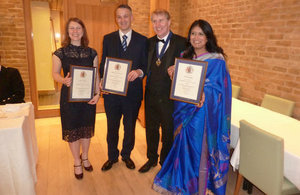Government Chemist at the APA Conference
Michael Walker represented the Government Chemist at the annual conference of the Association of Public Analysts, APA, in October 2017

(L-R)Emma Downie, Micheal Kierszten, Jon Griffin and Bharathi Reddy
Who are the Public Analysts?
Public Analysts are highly skilled scientists who carry out chemical analysis and related testing for public protection enforcement purposes. In Scotland, Public Analysts are also responsible for microbiological examination of food. Public Analysts are required to hold an MChemA (Mastership of Chemical Analysis), as prescribed by the Food Safety Regulations 2013. The Association of Public Analysts holds an annual conference, which includes recognising newly MChemA qualified candidates.
Annual APA conference - October 2017
The conference, set in the precincts of Canterbury Cathedral, was an informative and enjoyable occasion. Michael Walker, from the Government Chemist team, chaired a session of the conference and updated delegates on referee casework. Talks ranged widely from the contributions of George Wigner, a 19th Century Public Analyst to the preservation of Cleopatra’s Needle (Mr Chris Elliott, University of Southampton) to aquatic animal health (Dr Stephen Feist, Cefas, Weymouth Laboratory). Dr Jacqui McElhiney (Food Standards Scotland), discussed developing new food surveillance models in Scotland and Robbie Beattie (Edinburgh Scientific Services) described the molecular biology and microbiology of shigatoxigenic and verotoxigenic ‘Escherichia coli’. Key insights on global control measures for mycotoxins were given by Professor Ray Coker.
At the conference dinner the APA President, Jon Griffin MChemA, welcomed three new MChemA holders, Emma Downie (PASS Ltd), Micheal Kierszten (Dundee Scientific Services) and Bharathi Reddy (Lancashire Scientific Services). These scientists are looking forward to their first appointments as Public Analysts. The APA also awarded honorary membership to Professor Duncan Thorburn Burns FRSE MRIA in recognition of his lifetime research into food analysis and significant contributions to the Journal of the Association of Public Analysts.

Professor Duncan Thorburn with Jon Griffin
For more information about the work the Government Chemist does contact: